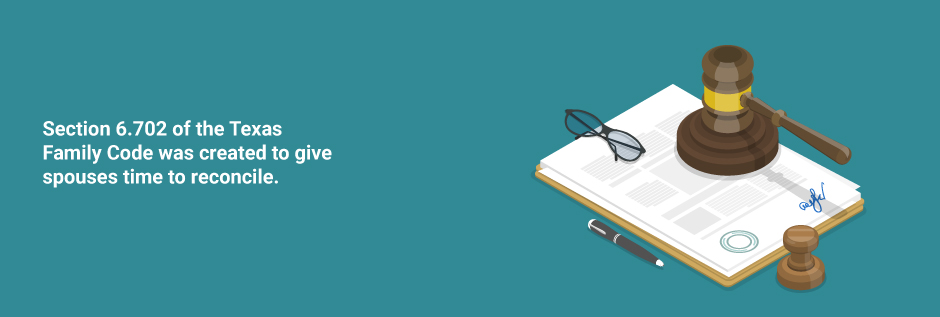Is There a 60 Day Waiting Period to Get a Divorce in Texas?
If you want to get a divorce in Texas, you may hear about a 60-day waiting period. In most cases, this waiting period is an absolute requirement. This article provides where the requirement comes from, the reason for its creation, how it works in the typical divorce suit, and the exceptions.
The Texas Family Code

The waiting period for divorce comes from the Texas Family Code. Section 6.702 of the Texas Family Code specifically states:
- (a) Except as provided by Subsection (c), the court may not grant a divorce before the 60th day after the date the suit was filed. A decree rendered in violation of this subsection is not subject to collateral attack.
- (b) A waiting period is not required before a court may grant an annulment or declare a marriage void other than as required in civil cases generally.
- (c) A waiting period is not required under Subsection (a) before a court may grant a divorce in a suit in which the court finds that:
- (1) the respondent has been finally convicted of or received deferred adjudication for an offense involving family violence as defined by Section 71.004 against the petitioner or a member of the petitioner’s household; or
- (2) the petitioner has an active protective order under Title 4 or an active magistrate’s order for emergency protection under Article 17.292, Code of Criminal Procedure, based on a finding of family violence, against the respondent because of family violence committed during the marriage.
The Family Code explains that a divorce case cannot finish on or before the 60th day after filing.
What Does Section 6.702 Mean?

Section 6.702 of the Texas Family Code was created to give spouses time to reconcile. As unlikely as one might think, reconciliation is not uncommon in divorce cases. Spouses may find out they no longer want a divorce, which is why Texas allows divorcing parties to nonsuit or drop the case during the pendency of the proceedings.
However, the usefulness of the 60 days has been debated. Some scholars believe the requirement is unnecessary, while others have requested the waiting period be increased. Legislation has been proposed on the very subject. Regardless of the debate, the waiting period is still set at 60 days.
How Does the 60-Day Waiting Period Work?

So, how does the 60-day waiting period work in the typical divorce case? When a spouse wishes to divorce the other spouse and reconciliation is impossible, either spouse can file a petition for divorce in the appropriate Texas county.
Once the petition is filed, the clerk of the court will usually add filing information to the petition including the filing date. The filing spouse will then count 60 days, not including the date of filing, to find out the last day of the waiting period.
For example, the last day of the waiting period for a petition filed on January 4, 2019, is March 5, 2019. If both parties reach an agreement on the divorce, the case can finish on or after March 6, 2019. The case does not have to finish on March 6, 2019, but it can finish if both spouses sign off on the final decree of divorce.
The spouses are not frozen during the waiting period, though. After the petition is filed, some form of service on the non-filing spouse will be necessary. That can be completed in the first 60 days.
If an emergency or temporary orders hearing is necessary, that can occur in the first 60 days. The parties can mediate and negotiate in the first 60 days.
If the parties reach an agreement in the first 60 days, a final decree of divorce can be prepared and signed. In some counties in Texas, the parties can even go to a final trial in the first 60 days. The only thing that cannot happen in the first 60 days after the petition is filed is the entry of a final decree of divorce.
Are There Exceptions to the 60-Day Waiting Period?

The only exception to the 60-day waiting period is if family violence has occurred. The rationale behind this exception is clear—Texas does not want to force an abused spouse to remain married to the abuser. Cases with family violence, therefore, have the option to finish faster than cases without family violence.
Finally, this 60-day waiting period, while found in the family code, does not apply to all family law cases. It generally only applies to divorces. Child custody cases not dealing with divorce do not have this requirement.
If a party is successful in arguing for an annulment or a void marriage, then the waiting period is also not required. See Tex. Fam. Code § 6.702(b). Other types of family law, such as adoptions, also do not have this waiting period; but other requirements will likely apply in such cases.

Contact a Trusted Divorce Attorney Today
If you are unsure of how these rules or other legal rules apply to your case, you should contact an attorney. The Wright Firm has several attorneys who can discuss your situation, your options, and legal representation for your family law case.
We have offices around the Dallas/Ft. Worth Metroplex in Dallas, Frisco, Lewisville, and Denton. We can be reached at 972-353-4600 or more information can be found at www.thewrightlawyers.com.


Leave a Reply
Want to join the discussion?Feel free to contribute!